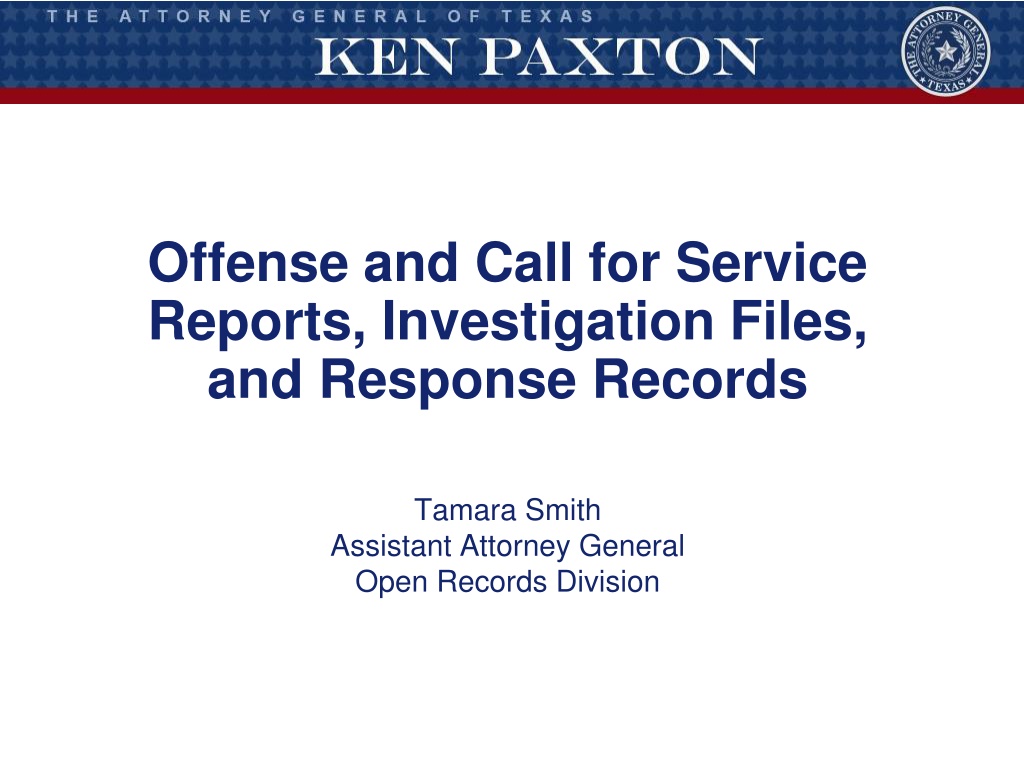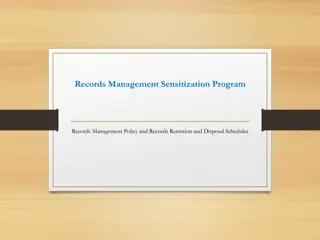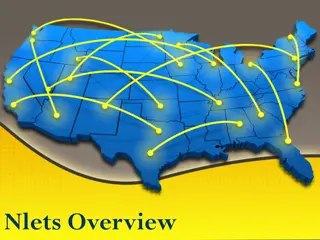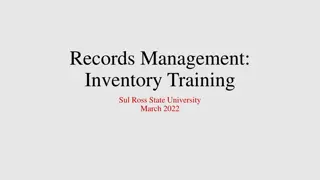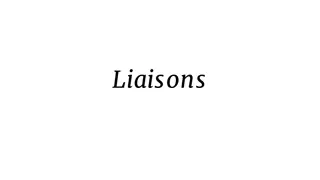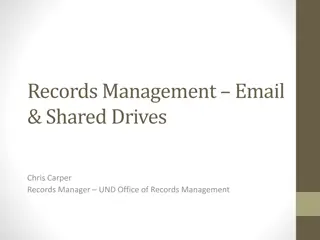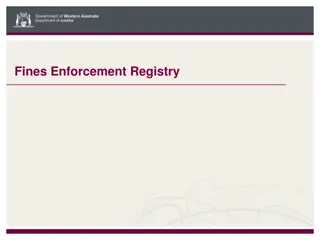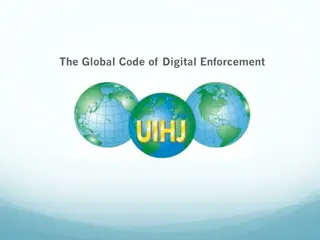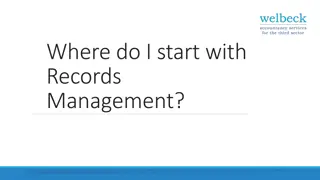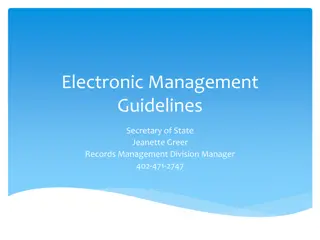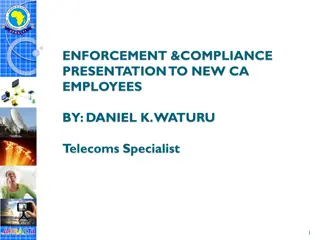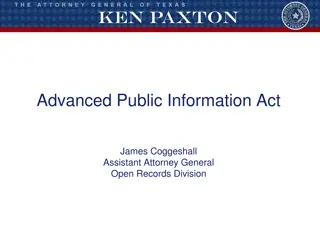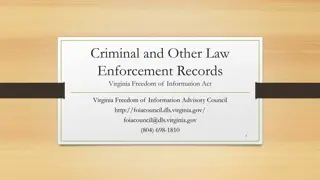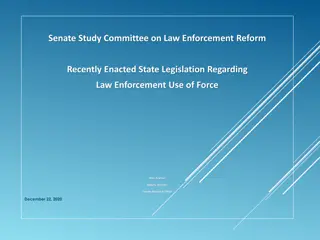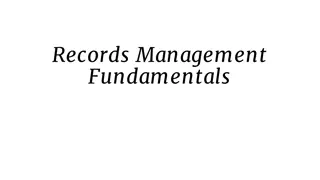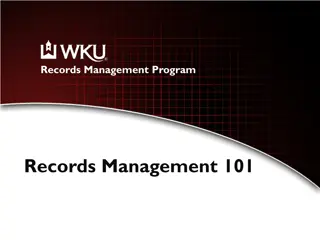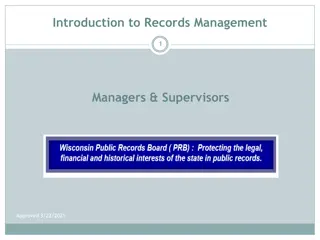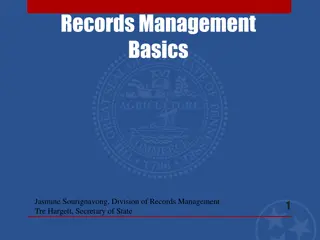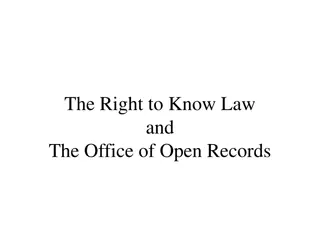Understanding Section 552.108(a)(1) in Law Enforcement Records
Learn about Section 552.108(a)(1) in relation to law enforcement records, its exceptions, and when it is appropriate to apply it. Discover tips for asserting this section and answering hypothetical scenarios regarding its usage.
Uploaded on Sep 27, 2024 | 0 Views
Download Presentation

Please find below an Image/Link to download the presentation.
The content on the website is provided AS IS for your information and personal use only. It may not be sold, licensed, or shared on other websites without obtaining consent from the author. Download presentation by click this link. If you encounter any issues during the download, it is possible that the publisher has removed the file from their server.
E N D
Presentation Transcript
Offense and Call for Service Reports, Investigation Files, and Response Records Tamara Smith Assistant Attorney General Open Records Division
Section 552.108(a)(1) (a) Information held by a law enforcement agency or prosecutor that deals with the detection, investigation, or prosecution of crime is excepted from the requirements of Section 552.021 if: (1) release of the information would interfere with the detection, investigation, or prosecution of crime
Tips When Asserting Section 552.108(a)(1) Explain how information is related to a pending criminal investigation or prosecution. It is a discretionary exception. Let the OAG know if some information is being released. Section 552.108(a)(1) is not applicable to information subject to sections 552.022(a)(2) through 552.022(a)(18), including court-filed documents 552.022(a)(17). subject to section
Hypothetical (Slide 1 of 2) In which of these situations is it appropriate to raise section 552.108(a)(1)? A. After a jury returned a verdict of not guilty and the case was dismissed B. After a police department finished its investigation and referred the case for prosecution C. After a defendant accepted deferred adjudication D. After the statute of limitations passed for an unsolved cold case
Hypothetical (Slide 2 of 2) In which of these situations is it appropriate to raise section 552.108(a)(1)? A. After a jury returned a verdict of not guilty and the case was dismissed B. After a police department finished its investigation and referred the case for prosecution C. After a defendant accepted deferred adjudication D. After the statute of limitations passed for an unsolved cold case
Hypothetical (Slide 1 of 8) A police department objects to the release of an incident report because the department states it is still investigating the alleged crime. The department seeks to withhold the incident report under section 552.108(a)(1). department raised this exception correctly? Has the A. Yes B. No
Hypothetical (Slide 2 of 8) Question: A police department objects to the release of an incident report because the department states it is still investigating the alleged crime. The department seeks to withhold the incident report under section 552.108(a)(1). Has the department raised this exception correctly? A. Yes B. No
Hypothetical (Slide 3 of 8) A police department has an offense report, a copy of the citation, and dash camera recordings. department not withhold under section 552.108(a)(1)? Which can the A. Citation B. Dash Camera Recordings C. Offense Report D. None of the above
Hypothetical (Slide 4 of 8) A police department has an offense report, a copy of the citation, and dash camera recordings. department not withhold under section 552.108(a)(1)? Which can the A. Citation B. Dash Camera Recordings C. Offense Report D. None of the above
Hypothetical (Slide 5 of 8) A police department has an offense report and a copy of the search warrant. Can the department withhold the search warrant under section 552.108(a)(1)? A. Yes B. No C. In some circumstances
Hypothetical (Slide 6 of 8) Question: A police department has an offense report and a copy of the search warrant. Can the department withhold the search warrant under section 552.108(a)(1)? A. Yes B. No C. In some circumstances
Hypothetical (Slide 7 of 8) Can a police department ever withhold information under section 552.108(a)(1) if it failed to comply with its deadlines under section 552.301? A. Yes, if the police department objects to its release B. Yes, if another governmental body objects to its release based on its own pending investigation C. Yes, section 552.108(a)(1) is compelling D. A and B
Hypothetical (Slide 8 of 8) Can a police department ever withhold information under section 552.108(a)(1) if it failed to comply with its deadlines under section 552.301? A. Yes, if the police department objects to its release B. Yes, if another governmental body objects to its release based on its own pending investigation C. Yes, section 552.108(a)(1) is compelling D. A and B
Section 552.108(c) Section 552.108 does not except from the requirements of Section 552.021 information that is basic information about an arrested person, an arrest, or a crime.
What is Basic Information? Basic information is the information held to be public in Houston Chronicle Publishing Co. v. City of Houston. Examples of basic information from Open Records Decision No. 127 (1976): Detailed description of the offense Arrestee s name Identification and description of the complainant
What is Not Basic Information? Motor vehicle record information Dates of birth Victim or witness information, if the victim or witness is not the complainant Photographs, dash camera video recordings, or 9-1-1 audio recordings
Hypothetical (Slide 1 of 2) An individual makes a report stating he is the victim of a crime. What information is considered basic information in the incident report? A. His motor vehicle record information B. His date of birth C. A photo of his injuries D. His name
Hypothetical (Slide 2 of 2) An individual makes a report stating he is the victim of a crime. What information is considered basic information in the incident report? A. His motor vehicle record information B. His date of birth C. A photo of his injuries D. His name
Section 552.108(a)(1) Section 552.108(a)(1) may be raised by an entity that is not a law enforcement agency or prosecutor when the entity is the proper custodian of information. The proper custodian must: Demonstrate the information relates to a pending case of a law enforcement agency; and Provide a representation from the law enforcement agency that it wishes to have the information withheld.
Hypothetical (Slide 1 of 2) When may an emergency service district withhold requested information under section 552.108(a)(1)? A. When it s on behalf of a law enforcement agency B. When a crime has been committed within the district C. When a crime has been committed by a district employee D. All of the above
Hypothetical (Slide 2 of 2) When may an emergency service district withhold requested information under section 552.108(a)(1)? A. When it s on behalf of a law enforcement agency B. When a crime has been committed within the district C. When a crime has been committed by a district employee D. All of the above
Section 552.108(a)(2) (a) Information held by a law enforcement agency or prosecutor that deals with the detection, investigation, or prosecution of crime is excepted from the requirements of Section 552.021 if: . . . (2) it is information that deals with the detection, investigation, or prosecution of crime only in relation to an investigation that did not result in conviction or deferred adjudication;
Tips When Asserting Section 552.108(a)(2) Explain how information is related to a closed criminal investigation or prosecution, and the disposition. It is a discretionary exception. Let the OAG know if some information is being released. Has not does not indicate the investigation or case is closed.
Hypothetical (Slide 1 of 2) If a governmental body states a case has not resulted in conviction or deferred adjudication, has the governmental body successfully raised section 552.108(a)(2)? A. Yes B. No
Hypothetical (Slide 2 of 2) If a governmental body states a case has not resulted in conviction or deferred adjudication, can the governmental body successfully claim section 552.108(a)(2)? A. Yes B. No
Section 552.101 Section confidential constitutional, statutory, and judicial decisions. 552.101 by protects law information of that Act, is including made outside the Section 552.101 must be raised in conjunction with another law or doctrine. Section 552.101 should not be raised in conjunction with one of the numbered exceptions in the Act.
Section 58.008(b) of the Family Code (Slide 1 of 2) (b) Except as provided by Subsection (c) , law enforcement records concerning a child and information concerning a child that are stored by electronic means or otherwise and from which a record could be generated may not be disclosed to the public and shall be: (1) if maintained on paper or microfilm, kept separate from adult records; (2) if maintained electronically in the same computer system as adult records, accessible only under controls that are separate and distinct from the controls to access electronic data concerning adults; and (3) maintained on a local basis only and not sent to a central state or federal depository, except as provided by Subsection (c) or Subchapter B, D, or E.
Section 58.008(b) of the Family Code (Slide 2 of 2) Protects law enforcement records of a child relating to delinquent conduct or conduct indicating a need for supervision that occurred before, on, or after September 1, 1997. Section 51.02(2) of the Family Code defines a child as 10 to 16 years of age at the time the conduct occurred. Previously covered by sections 51.14 and 58.007(c) of the Family Code.
Section 58.008(d) of the Family Code (d) Law enforcement records concerning a child may be inspected or copied by: (1) a juvenile justice agency, as defined by Section 58.101; (2) a criminal justice agency, as defined by Section 411.082, Government Code; (3) the child; (4) the child s parent or guardian; or (5) the chief executive officer or the officer s designee of a primary or secondary school where the child is enrolled only for the purpose of conducting a threat assessment or preparing a safety plan related to the child.
Section 58.008(e) of the Family Code (e) Before a child or a child's parent or guardian may inspect or copy a record concerning the child under Subsection (d), the custodian of the record shall redact: (1) any personally identifiable information about a juvenile suspect, offender, victim, or witness who is not the child; and (2) any information that is excepted from required disclosure under Chapter 552, Government Code, or any other law.
Tips When Raising Section 58.008(b) of the Family Code Section 58.008 only applies when a child is the suspect, arrestee, or defendant. The alleged offense or conduct must meet the definitions found in the Family Code. Transportation Code violations do not meet the requirements of section 58.008. Section 58.008 is a mandatory exception. The requestor may have a right of access. Other exceptions may still be raised.
Hypothetical (Slide 1 of 10) Which of these incidents is subject to section 58.008(b) of the Family Code? A. Parents report their 9 year-old son ran away B. Police arrest a 17 year-old for underage drinking C. A 16 year-old cashier reports that her store has been robbed D. Police arrest a 13 year-old suspect for vandalism
Hypothetical (Slide 2 of 10) Which of these incidents is subject to section 58.008(b) of the Family Code? A. Parents report their 9 year-old son ran away B. Police arrest a 17 year-old for underage drinking C. A 16 year-old cashier reports that her store has been robbed D. Police arrest a 13 year-old suspect for vandalism
Hypothetical (Slide 3 of 10) Which of these individuals has a right of access to reports otherwise confidential under section 58.008(b)? A. A juvenile or criminal justice agency B. The child C. The child s parent or guardian D. All of the above
Hypothetical (Slide 4 of 10) Which of these individuals has a right of access to reports otherwise confidential under section 58.008(b)? A. A juvenile or criminal justice agency B. The child C. The child s parent or guardian D. All of the above
Hypothetical (Slide 5 of 10) An attorney representing the mother of a 14 year-old who was arrested for underage drinking requests the child s incident report. Does she have a right of access? A. Yes B. No
Hypothetical (Slide 6 of 10) An attorney representing the mother of a 14 year-old who was arrested for underage drinking requests the child s incident report. Does she have a right of access? A. Yes B. No
Hypothetical (Slide 7 of 10) In the same incident report, a 15 year-old classmate was also arrested. Can the classmate s information be released? A. Yes B. No
Hypothetical (Slide 8 of 10) In the same incident report, a 15 year-old classmate was also arrested. Can the classmate s information be released? A. Yes B. No
Hypothetical (Slide 9 of 10) For the same incident report and requestor, can other provisions of law be raised to withhold the report? A. Yes B. No
Hypothetical (Slide 10 of 10) For the same incident report and requestor, can other provisions of law be raised to withhold the report? A. Yes B. No
Section 261.201(a) of the Family Code (Slide 1 of 2) (a) Except as provided by Section 261.203, the following information is confidential, is not subject to the Act, and may be disclosed only for purposes consistent with the Family Code and applicable federal or state law or under rules adopted by an investigating agency: (1) a report of alleged or suspected abuse or neglect made under this chapter and the identity of the person making the report; and (2) except as otherwise provided in this section, the files, reports, records, communications, audiotapes, videotapes, and working papers used or developed in an investigation under this chapter or in providing services as a result of an investigation.
Section 261.201(a) of the Family Code (Slide 1 of 2) Abuse and neglect are defined in section 261.001 of the Family Code Investigation must be conducted by an agency authorized to conduct child abuse and neglect investigations. Section 101.003(a) defines child victim as under the age of 18 at the time of the alleged abuse or neglect.
Section 261.201(k) of the Family Code (k) Notwithstanding Subsection (a), an investigating agency, other than the Texas Department of Family and Protective Services or the Texas Juvenile Justice Department, on request, shall provide to the parent, managing conservator, or other legal representative of a child who is the subject of reported abuse or neglect, or to the child if the child is at least 18 years of age, information concerning the reported abuse or neglect that would otherwise be confidential under this section. The investigating information under this subsection if the parent, managing conservator, or other legal representative of the child requesting the information is alleged to have committed the abuse or neglect. agency shall withhold
Section 261.201(l) of the Family Code (l) Before a child or a parent, managing conservator, or other legal representative of a child may inspect or copy a record or file concerning the child under Subsection (k), the custodian of the record or file must redact: (1) any personally identifiable information about a victim or witness under 18 years of age unless that victim or witness is: (A) the child who is the subject of the report; or (B) another child of the parent, managing conservator, or other legal representative requesting the information; (2) any information that is excepted from required disclosure under Chapter 552, Government Code, or other law; and (3) the identity of the person who made the report.
Section 261.201(h) of the Family Code (h) This section does not apply to an investigation of child abuse or neglect in a home or facility regulated under Chapter 42, Human Resources Code. For example, daycare facilities These homes and facilities can be found on the Texas Department of Family and Protective Services website.
Tips When Raising Section 261.201 of the Family Code Explain whether the requested information consists of a report of or was used in a child abuse or neglect investigation or contains the identity of an individual who made a report of child abuse or neglect. Tell us the age of the child victim. Section 261.201 is a mandatory exception. Explain whether the requestor has a right of access. Other exceptions may still be raised.
Hypothetical (Slide 1 of 10) A sheriff s office received a request for information relating to alleged child abandonment involving a 5 year-old and a 7 year-old. The sheriff s office objects to the request by raising section 261.201. Has the sheriff s office raised this exception correctly? A. Yes B. No
Hypothetical (Slide 2 of 10) A sheriff s office received a request for information relating to alleged child abandonment involving a 5 year-old and a 7 year-old. The sheriff s office objects to the request by raising section 261.201. Has the sheriff s office raised this exception correctly? A. Yes B. No
Hypothetical (Slide 3 of 10) A police department received a request for information relating to alleged child abuse of a 2 year-old by an employee at a licensed daycare. The department objects to the request by raising section 261.201. Has the department raised this exception correctly? A. Yes B. No
